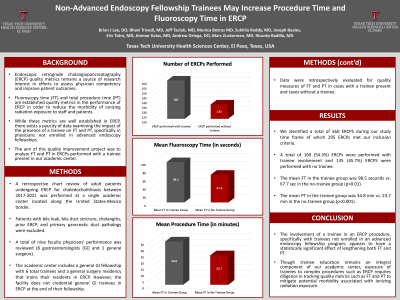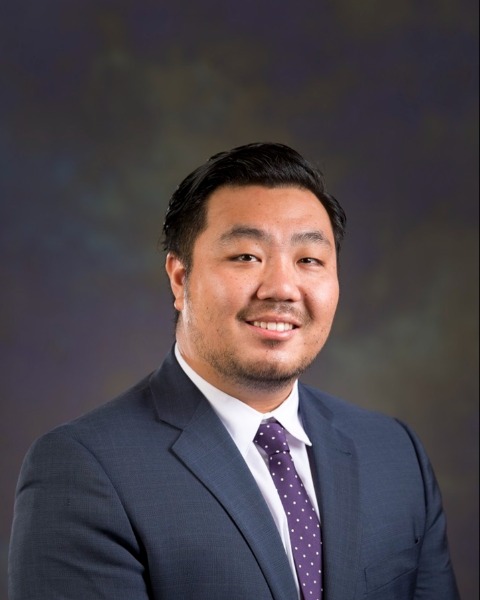Tuesday Poster Session
Category: Practice Management
P4070 - Non-Advanced Endoscopy Fellowship Trainees May Increase Procedure Time and Fluoroscopy Time in ERCP
Tuesday, October 24, 2023
10:30 AM - 4:00 PM PT
Location: Exhibit Hall

Has Audio

Brian Lee, DO
Texas Tech University Health Sciences Center
El Paso, TX
Presenting Author(s)
Brian Lee, DO1, Bhavi Trivedi, MD1, Jeff Angelo Taclob, MD1, Monica Botros, MD1, Sukhila Reddy, MD2, Eric Tatro, MD1, Ammar Kalas, MD2, Andrew Ortega, MD2, Marc Zuckerman, MD1, Ricardo Badillo, MD1
1Texas Tech University Health Sciences Center, El Paso, TX; 2Texas Tech, El Paso, TX
Introduction: Endoscopic retrograde cholangiopancreatography (ERCP) quality metrics remains a source of research interest in efforts to assess physician competency and improve patient outcomes. Fluoroscopy time (FT) and total procedure time (PT) are established quality metrics in the performance of ERCP in order to reduce the morbidity of ionizing radiation exposure to staff and patients. While these metrics are well established in ERCP, there exists a paucity of data examining the impact of the presence of a trainee on FT and PT, specifically in physicians not enrolled in advanced endoscopy fellowships. The aim of this quality improvement project was to analyze FT and PT in ERCPs performed with a trainee present in our academic center.
Methods: A retrospective chart review was performed at a single academic center, located along the United States-Mexico border, of adult patients undergoing ERCP for choledocholithiasis between 2017-2021. Patients with bile leak, bile duct stricture, cholangitis, prior ERCP, and primary pancreatic duct (PD) pathology were excluded. A total of nine faculty physicians performance was reviewed (8 gastroenterologists [GI] and 1 surgeon). The academic center includes a general GI fellowship with 6 total trainees and a general surgery residency that trains their residents in ERCP. However, our facility does not credential general GI trainees in ERCP at the end of their fellowship. Data were retrospectively evaluated for quality measures of FT and PT in cases with a trainee present and cases without a trainee.
Results: We identified a total of 560 ERCPS during our study time frame of which 295 ERCPs met our inclusion criteria. A total of 160 (54.3%) ERCPs were performed with trainee involvement and 135 (45.7%) ERCPS were performed with no trainee. The mean FT in the trainee group was 98.5 seconds vs. 67.7 sec in the no-trainee group (p< 0.01). The mean PT in the trainee group was 34.8 min vs. 23.7 min in the no-trainee group (p< 0.001).
Discussion: The involvement of a trainee in an ERCP procedure, specifically with trainees not enrolled in an advanced endoscopy fellowship program, appears to have a statistically significant effect of lengthening both FT and PT. Though trainee education remains an integral component of our academic center, exposure of trainees to complex procedures such as ERCP requires diligence in tracking quality metrics such as FT and PT to mitigate potential morbidity associated with ionizing radiation exposure.
Disclosures:
Brian Lee, DO1, Bhavi Trivedi, MD1, Jeff Angelo Taclob, MD1, Monica Botros, MD1, Sukhila Reddy, MD2, Eric Tatro, MD1, Ammar Kalas, MD2, Andrew Ortega, MD2, Marc Zuckerman, MD1, Ricardo Badillo, MD1. P4070 - Non-Advanced Endoscopy Fellowship Trainees May Increase Procedure Time and Fluoroscopy Time in ERCP, ACG 2023 Annual Scientific Meeting Abstracts. Vancouver, BC, Canada: American College of Gastroenterology.
1Texas Tech University Health Sciences Center, El Paso, TX; 2Texas Tech, El Paso, TX
Introduction: Endoscopic retrograde cholangiopancreatography (ERCP) quality metrics remains a source of research interest in efforts to assess physician competency and improve patient outcomes. Fluoroscopy time (FT) and total procedure time (PT) are established quality metrics in the performance of ERCP in order to reduce the morbidity of ionizing radiation exposure to staff and patients. While these metrics are well established in ERCP, there exists a paucity of data examining the impact of the presence of a trainee on FT and PT, specifically in physicians not enrolled in advanced endoscopy fellowships. The aim of this quality improvement project was to analyze FT and PT in ERCPs performed with a trainee present in our academic center.
Methods: A retrospective chart review was performed at a single academic center, located along the United States-Mexico border, of adult patients undergoing ERCP for choledocholithiasis between 2017-2021. Patients with bile leak, bile duct stricture, cholangitis, prior ERCP, and primary pancreatic duct (PD) pathology were excluded. A total of nine faculty physicians performance was reviewed (8 gastroenterologists [GI] and 1 surgeon). The academic center includes a general GI fellowship with 6 total trainees and a general surgery residency that trains their residents in ERCP. However, our facility does not credential general GI trainees in ERCP at the end of their fellowship. Data were retrospectively evaluated for quality measures of FT and PT in cases with a trainee present and cases without a trainee.
Results: We identified a total of 560 ERCPS during our study time frame of which 295 ERCPs met our inclusion criteria. A total of 160 (54.3%) ERCPs were performed with trainee involvement and 135 (45.7%) ERCPS were performed with no trainee. The mean FT in the trainee group was 98.5 seconds vs. 67.7 sec in the no-trainee group (p< 0.01). The mean PT in the trainee group was 34.8 min vs. 23.7 min in the no-trainee group (p< 0.001).
Discussion: The involvement of a trainee in an ERCP procedure, specifically with trainees not enrolled in an advanced endoscopy fellowship program, appears to have a statistically significant effect of lengthening both FT and PT. Though trainee education remains an integral component of our academic center, exposure of trainees to complex procedures such as ERCP requires diligence in tracking quality metrics such as FT and PT to mitigate potential morbidity associated with ionizing radiation exposure.
Disclosures:
Brian Lee indicated no relevant financial relationships.
Bhavi Trivedi indicated no relevant financial relationships.
Jeff Angelo Taclob indicated no relevant financial relationships.
Monica Botros indicated no relevant financial relationships.
Sukhila Reddy indicated no relevant financial relationships.
Eric Tatro indicated no relevant financial relationships.
Ammar Kalas indicated no relevant financial relationships.
Andrew Ortega indicated no relevant financial relationships.
Marc Zuckerman indicated no relevant financial relationships.
Ricardo Badillo indicated no relevant financial relationships.
Brian Lee, DO1, Bhavi Trivedi, MD1, Jeff Angelo Taclob, MD1, Monica Botros, MD1, Sukhila Reddy, MD2, Eric Tatro, MD1, Ammar Kalas, MD2, Andrew Ortega, MD2, Marc Zuckerman, MD1, Ricardo Badillo, MD1. P4070 - Non-Advanced Endoscopy Fellowship Trainees May Increase Procedure Time and Fluoroscopy Time in ERCP, ACG 2023 Annual Scientific Meeting Abstracts. Vancouver, BC, Canada: American College of Gastroenterology.
